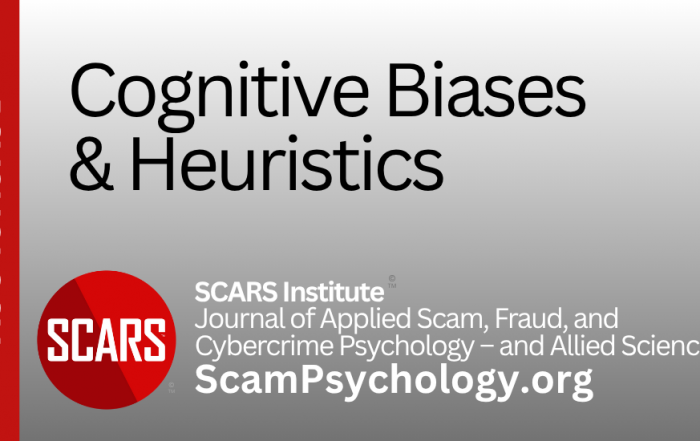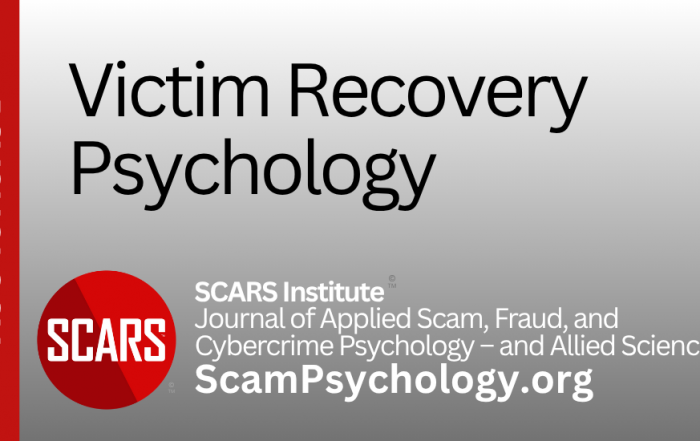Author:
• Tim McGuinness, PhD DFin, MCPO, MAnth – Anthropologist, Scientist, Director of the Society of Citizens Against Relationship Scams Inc.
Abstract:
Cortisol, often termed the “stress hormone,” is produced by the adrenal glands and plays a critical role in the body’s response to stress. It regulates various functions such as metabolism, immune response, blood pressure, and the sleep-wake cycle.
During stress, cortisol increases blood glucose levels, suppresses non-essential functions like digestion and reproduction, and enhances brain function. Chronic stress can lead to prolonged high cortisol levels, resulting in immune suppression, weight gain, insulin resistance, hypertension, anxiety, depression, and cognitive decline.
For scam victims, persistent high cortisol levels can cause significant emotional, psychological, and physical health issues, including increased anxiety, depression, trust issues, immune dysfunction, and metabolic problems. Understanding cortisol’s impact can help victims of scams recognize stress effects and seek appropriate support and treatment to manage their symptoms and recover from trauma.

Understanding Cortisol: What It Is, What It Does, and Its Impact on Scam Victims
What is Cortisol
Cortisol is a hormone produced by the adrenal glands, which are located on top of the kidneys.
Often referred to as the “stress hormone,” cortisol plays a vital role in the body’s response to stress. It is involved in various functions, including regulating metabolism, reducing inflammation, and controlling the sleep-wake cycle. Cortisol is essential for overall health, but when levels are too high for prolonged periods, it can lead to negative health effects.
What Cortisol Does
When you encounter a stressful situation, your body initiates a “fight or flight” response thanks to the Amygdala, during which cortisol is released into the bloodstream. This hormone helps your body cope with stress by:
- Increasing blood sugar levels to provide immediate energy.
- Enhancing the brain’s use of glucose, boosting alertness and focus.
- Suppressing non-essential functions, such as digestion, growth, and reproductive systems, to prioritize dealing with the stressor.
Cortisol Functions
Cortisol is a steroid hormone produced by the adrenal glands, which are located on top of the kidneys. It plays a crucial role in various bodily functions, primarily helping the body respond to stress. Here are some of its primary purposes:
Regulation of Metabolism
Cortisol helps control the way the body uses fats, proteins, and carbohydrates. It influences energy levels by regulating the conversion of these macronutrients into glucose, which is used for energy. This process ensures that the body has a steady supply of energy, especially during stressful situations.
Immune Response
Cortisol has significant anti-inflammatory effects. It helps modulate the immune response by reducing inflammation and dampening the activity of the immune system. This prevents the immune system from overreacting and potentially causing damage to the body’s own tissues.
Stress Response
Often termed the “stress hormone,” cortisol is released in higher levels during the body’s fight-or-flight response. When faced with a stressful situation, cortisol prepares the body to handle it by increasing glucose in the bloodstream, enhancing brain function, and increasing the availability of substances that repair tissues. See more below.
Blood Pressure Regulation
Cortisol helps maintain blood pressure by regulating the body’s salt and water balance. It affects the balance of sodium and potassium, which are crucial for maintaining normal blood pressure levels.
Sleep-Wake Cycle Regulation
Cortisol follows a diurnal rhythm, meaning its levels fluctuate throughout the day. It typically peaks in the early morning and gradually decreases throughout the day, reaching its lowest levels at night. This pattern helps regulate the sleep-wake cycle and maintain alertness during the day.
Anti-Stress and Recovery
After a stressful event, cortisol helps restore homeostasis in the body. It reduces the impact of stress by managing inflammation, supporting the immune system, and promoting the healing of tissues.
The Stress Response
The stress response, also known as the fight-or-flight response, is the body’s way of reacting to perceived threats. When a person encounters a stressful situation, the hypothalamus in the brain triggers the release of a cascade of hormones:
Activation of the Hypothalamus-Pituitary-Adrenal (HPA) Axis:
-
- Hypothalamus: Detects stress and releases corticotropin-releasing hormone (CRH).
- Pituitary Gland: Responds to CRH by secreting adrenocorticotropic hormone (ACTH).
- Adrenal Glands: ACTH stimulates the adrenal glands to produce and release cortisol.
Role of Cortisol in Stress Response
Energy Mobilization:
-
- Increase in Blood Glucose: Cortisol stimulates gluconeogenesis (production of glucose from non-carbohydrate sources) in the liver, ensuring that enough glucose is available for energy.
- Protein and Fat Metabolism: It aids in breaking down proteins and fats to provide energy.
Suppression of Non-Essential Functions:
-
- Immune System Suppression: Cortisol reduces inflammation and suppresses immune system activity to divert energy towards dealing with the stressor.
- Inhibition of Digestion, Growth, and Reproduction: These processes are deemed non-essential during acute stress and are temporarily suppressed.
Enhancement of Brain Function:
-
- Increased Alertness: Cortisol increases the availability of glucose to the brain, enhancing its function and promoting alertness.
- Memory Formation: Short-term exposure to cortisol can improve memory formation related to the stressful event.
Cardiovascular Effects:
-
- Increased Blood Pressure: Cortisol enhances the constriction of blood vessels, leading to increased blood pressure, which helps deliver more oxygen and nutrients to critical organs.
Impact of Chronic Stress
While cortisol is beneficial for handling acute stress, chronic stress leading to prolonged cortisol exposure can have detrimental effects:
Immune System Suppression:
-
- Increased Susceptibility to Infections: Chronic high levels of cortisol can weaken the immune system, making the body more vulnerable to infections.
Weight Gain and Metabolic Issues:
-
- Abdominal Fat Accumulation: Prolonged high cortisol levels can lead to increased fat storage, especially in the abdominal area.
- Insulin Resistance: Chronic cortisol exposure can contribute to insulin resistance, increasing the risk of type 2 diabetes. See more below.
Cardiovascular Problems:
-
- Hypertension: Persistent high blood pressure due to chronic cortisol can lead to hypertension and other cardiovascular diseases.
Mental Health Issues:
-
- Anxiety and Depression: Prolonged exposure to cortisol is linked to anxiety, depression, and other mental health disorders.
- Cognitive Decline: Chronic stress and elevated cortisol levels can impair cognitive functions and contribute to memory loss.
Interaction Between Cortisol and Dopamine
Stress Response Activation:
- When an individual experiences stress, the hypothalamic-pituitary-adrenal (HPA) axis is activated, leading to increased cortisol production.
- Acute stress can also lead to an initial increase in dopamine, which might explain why some people feel more alert and motivated in short-term stressful situations.
Chronic Stress and Dopamine Depletion:
- Prolonged stress leads to sustained high levels of cortisol, which can eventually deplete dopamine levels.
- This depletion is associated with reduced motivation, pleasure, and increased feelings of depression and anxiety.
Effects on Weight Gain
Cortisol and Fat Storage:
-
- Cortisol promotes fat storage, particularly in the abdominal region. This is because abdominal fat cells have more cortisol receptors and are more efficient at storing energy.
- High cortisol levels can increase appetite and cravings for high-calorie, sugary foods, leading to overeating and weight gain.
Dopamine and Eating Behavior:
-
- Reduced dopamine levels can lead to decreased motivation and pleasure, making individuals more likely to seek comfort in food to compensate for low mood.
- Comfort eating often involves high-sugar and high-fat foods, which temporarily boost dopamine levels, creating a cycle of stress eating.
Insulin Resistance:
-
- Chronic cortisol elevation can lead to insulin resistance, a condition where cells become less responsive to insulin, causing higher blood sugar levels and increased fat storage.
- Insulin resistance is a risk factor for obesity and type 2 diabetes.
Psychological Trauma and Weight Gain
Emotional Eating:
-
- Trauma and chronic stress can lead to emotional eating as a coping mechanism, where individuals eat to soothe negative emotions.
- Emotional eating often involves consuming large quantities of high-calorie foods, contributing to weight gain.
Metabolic Changes:
-
- Chronic stress and trauma can disrupt normal metabolic processes, leading to increased fat storage and difficulty losing weight.
- Stress-related hormones can alter the balance of hunger-regulating hormones, such as ghrelin and leptin, leading to increased appetite and reduced satiety.
Effects on Scam Victims
Victims of scams and deception often experience high levels of stress and anxiety, leading to elevated cortisol levels. Here’s how this hormone affects them:
Immediate Stress Response: When someone realizes they are being scammed, their body responds with a surge of cortisol. This can lead to symptoms such as increased heart rate, heightened alertness, and a sense of panic. These reactions are part of the body’s natural defense mechanism, but they can be overwhelming and distressing.
Prolonged Stress and Health Impact: Continuous exposure to high stress, as experienced by scam victims who may face ongoing deception or harassment, keeps cortisol levels elevated. Chronic high cortisol can lead to various health issues, including:
-
- Anxiety and Depression: Persistent stress can deplete the brain’s serotonin levels, leading to mood disorders.
- Weight Gain: Cortisol increases appetite and cravings for high-fat, high-sugar foods, which can result in weight gain.
- Sleep Problems: Elevated cortisol disrupts the sleep-wake cycle, causing insomnia or poor-quality sleep.
- Weakened Immune System: High cortisol suppresses the immune response, making individuals more susceptible to infections and illnesses.
Relation to Psychological Trauma
Psychological trauma, such as that experienced by scam victims, can have long-lasting effects on cortisol levels. The trauma can create a constant state of alertness and anxiety, where the body feels it is continuously under threat. This chronic stress response can have several impacts:
- Hypervigilance: Victims may become overly cautious and always on the lookout for potential threats, affecting their ability to relax and feel safe.
- Emotional Instability: Persistent high cortisol can lead to emotional numbness, irritability, and difficulty managing emotions.
- Difficulty Trusting Others: After being deceived, victims may struggle to trust people, fearing further betrayal and harm. This can affect personal relationships and social interactions.
Effects on Victims of Scams and Deception
For victims of scams and deception, the chronic stress they experience can result in prolonged cortisol release, leading to various negative health outcomes:
Emotional and Psychological Impact:
-
- Increased Anxiety and Depression: The stress of being deceived can cause sustained high cortisol levels, contributing to anxiety and depression.
- Trust Issues: Persistent stress can result in long-term trust issues and difficulties in forming new relationships.
Physical Health Consequences:
-
- Immune Dysfunction: The stress and resulting high cortisol levels can weaken the immune system, making victims more susceptible to illnesses.
- Weight and Metabolic Issues: Victims may experience weight gain, particularly around the abdomen, and metabolic issues such as insulin resistance.
Cognitive Effects:
-
- Memory and Concentration Problems: Chronic stress can impair cognitive functions, affecting memory and concentration.
Summary
Cortisol is essential for maintaining various bodily functions, especially in response to stress. It ensures that the body can efficiently manage energy, maintain homeostasis, and recover from stressful events. However, when cortisol levels are chronically elevated due to prolonged stress, it can lead to negative health outcomes such as immune suppression, weight gain, and increased risk of chronic diseases.
Cortisol plays a crucial role in managing stress, but prolonged high levels due to scams and deception can have detrimental effects on both physical and mental health. Understanding the role of cortisol can help victims recognize the impact of stress and seek appropriate support and treatment to manage their symptoms and recover from the psychological trauma of being scammed.
Sources
- Harvard Health Publishing – The effects of stress on your body
- Harvard Health Publishing – Stress and the Relaxation Response
- Mayo Clinic – Cortisol: What It Does & Its Effects
- Mayo Clinic – Chronic stress puts your health at risk
- National Institute of Mental Health – 5 Things You Should Know About Stress (nih.gov)
- Adrenal Hormones | Endocrine Society
Additional
- Scam Victim Stress – The Psychological, Cerebral, and Physiological Effects – 2024 (scamsnow.com)
- The Amygdala – An Introduction – Scam Victim Neurology – 2024 (scampsychology.org)
- Dopamine And Scam Victims – 2024 Post (scampsychology.org)
- Dopamine Signaling And The Neurology Of Scam Victims – 2024 (scampsychology.org)
Related Information
The manipulation tactics used by relationship scammers, crypto investment scammers, and sextortion scammers often leverage dopamine signaling in the brain to control their victims. Here’s a breakdown of how these tactics work, supported by recent studies:
Dopamine and Reward Mechanisms:
Scammers exploit the brain’s reward system by creating situations that trigger dopamine release, which reinforces certain behaviors. For example, in relationship scams, victims receive affectionate messages and attention, which activate dopamine pathways similar to those triggered by genuine romantic interactions. This reinforcement makes victims more susceptible to manipulation and less likely to notice red flags (JNeurosci) (ScienceDaily).
Transition from Goal-Directed to Habitual Behavior:
The manipulation tactics used by scammers can shift victims’ behavior from goal-directed actions to habitual responses. This is particularly evident in investment scams, where initial small rewards (returns on investment) lead to a habit of trust and further investment. Dopamine plays a crucial role in this shift by reinforcing repeated behaviors, eventually making them less sensitive to negative outcomes or risk evaluations (JNeurosci).
Emotional Manipulation and Cognitive Biases:
Sextortion scammers often use fear and urgency to manipulate victims. This type of emotional manipulation can significantly affect dopamine signaling, creating a heightened state of arousal and stress. Studies have shown that high levels of dopamine during stressful situations can impair decision-making and increase susceptibility to cognitive biases, making victims more likely to comply with demands to avoid perceived threats (ScienceDaily).
Habit Formation and Long-Term Behavioral Changes:
Chronic manipulation and repeated engagement with scammers can lead to long-term changes in brain structure and function. Research indicates that sustained exposure to manipulative tactics can enhance the formation of habits, driven by dopamine signaling pathways. This can lead to persistent behaviors even in the face of negative consequences, as seen in victims who continue to send money or personal information despite evidence of the scam (JNeurosci).
These studies highlight the significant role of dopamine in the manipulation strategies employed by various types of scammers. Understanding these mechanisms can help in developing better preventive measures and support systems for victims of such scams.
IMPORTANT NOTE: This article is intended to be an introductory overview of complex psychological, neurological, physiological, or other concepts, written primarily to help victims of crime understand the wide-ranging actual or potential effects of psychological trauma they may be experiencing. The goal is to provide clarity and validation for the confusing and often overwhelming symptoms that can follow a traumatic event. It is critical to understand that this content is for informational purposes only and does not constitute or is not a substitute for professional medical advice, diagnosis, or treatment. If you are experiencing distress or believe you are suffering from trauma or its effects, it is essential to consult with a qualified mental health professional for personalized care and support.

Welcome to the SCARS INSTITUTE Journal of Scam Psychology
A Journal of Applied Scam, Fraud, and Cybercrime Psychology – and Allied Sciences
A dedicated site for psychology, victimology, criminology, applied sociology and anthropology, and allied sciences, published by the SCARS INSTITUTE™ – Society of Citizens Against Relationship Scams Inc.
TABLE OF CONTENTS
A Question of Trust
At the SCARS Institute, we invite you to do your own research on the topics we speak about and publish, Our team investigates the subject being discussed, especially when it comes to understanding the scam victims-survivors experience. You can do Google searches but in many cases, you will have to wade through scientific papers and studies. However, remember that biases and perspectives matter and influence the outcome. Regardless, we encourage you to explore these topics as thoroughly as you can for your own awareness.
Please Leave A Comment
Recent Comments
On Other Articles
[better_recent_comments number=”5″ format=”{avatar} on {post}: “{comment}” {date}” avatar_size=”20″]
A Note About Labeling!
We often use the term ‘scam victim’ in our articles, but this is a convenience to help those searching for information in search engines like Google. It is just a convenience and has no deeper meaning. If you have come through such an experience, YOU are a Survivor! It was not your fault. You are not alone! Axios!
Statement About Victim Blaming
Some of our articles discuss various aspects of victims. This is both about better understanding victims (the science of victimology) and their behaviors and psychology. This helps us to educate victims/survivors about why these crimes happened and to not blame themselves, better develop recovery programs, and to help victims avoid scams in the future. At times this may sound like blaming the victim, but it does not blame scam victims, we are simply explaining the hows and whys of the experience victims have.
These articles, about the Psychology of Scams or Victim Psychology – meaning that all humans have psychological or cognitive characteristics in common that can either be exploited or work against us – help us all to understand the unique challenges victims face before, during, and after scams, fraud, or cybercrimes. These sometimes talk about some of the vulnerabilities the scammers exploit. Victims rarely have control of them or are even aware of them, until something like a scam happens and then they can learn how their mind works and how to overcome these mechanisms.
Articles like these help victims and others understand these processes and how to help prevent them from being exploited again or to help them recover more easily by understanding their post-scam behaviors. Learn more about the Psychology of Scams at www.ScamPsychology.org
Psychology Disclaimer:
All articles about psychology, neurology, and the human brain on this website are for information & education only
The information provided in these articles is intended for educational and self-help purposes only and should not be construed as a substitute for professional therapy or counseling.
While any self-help techniques outlined herein may be beneficial for scam victims seeking to recover from their experience and move towards recovery, it is important to consult with a qualified mental health professional before initiating any course of action. Each individual’s experience and needs are unique, and what works for one person may not be suitable for another.
Additionally, any approach may not be appropriate for individuals with certain pre-existing mental health conditions or trauma histories. It is advisable to seek guidance from a licensed therapist or counselor who can provide personalized support, guidance, and treatment tailored to your specific needs.
If you are experiencing significant distress or emotional difficulties related to a scam or other traumatic event, please consult your doctor or mental health provider for appropriate care and support.
Also, please read our SCARS Institute Statement About Professional Care for Scam Victims – here
If you are in crisis, feeling desperate, or in despair please call 988 or your local crisis hotline.
SCARS Institute Resources:
- If you are a victim of scams, go to www.ScamVictimsSupport.org for real knowledge and help
- Enroll in SCARS Scam Survivor’s School now at www.SCARSeducation.org
- To report criminals, visit reporting.AgainstScams.org – we will NEVER give your data to money recovery companies like some do!
- Sign up for our free support & recovery help at www.SCARScommunity.org
- Follow us and find our podcasts, webinars, and helpful videos on YouTube: www.youtube.com/@RomancescamsNowcom
- SCARS Institute Songs for Victim-Survivors: www.youtube.com/playlist…
- Learn about the Psychology of Scams at www.ScamPsychology.org
- Dig deeper into the reality of scams, fraud, and cybercrime at www.ScamsNOW.com and www.RomanceScamsNOW.com
- Scam Survivor’s Stories: www.ScamSurvivorStories.org
- For Scam Victim Advocates, visit www.ScamVictimsAdvocates.org
- See more scammer photos on www.ScammerPhotos.com















![niprc1.png1_-150×1501-11[1]](https://scampsychology.org/wp-content/uploads/2025/05/niprc1.png1_-150x1501-111.webp)